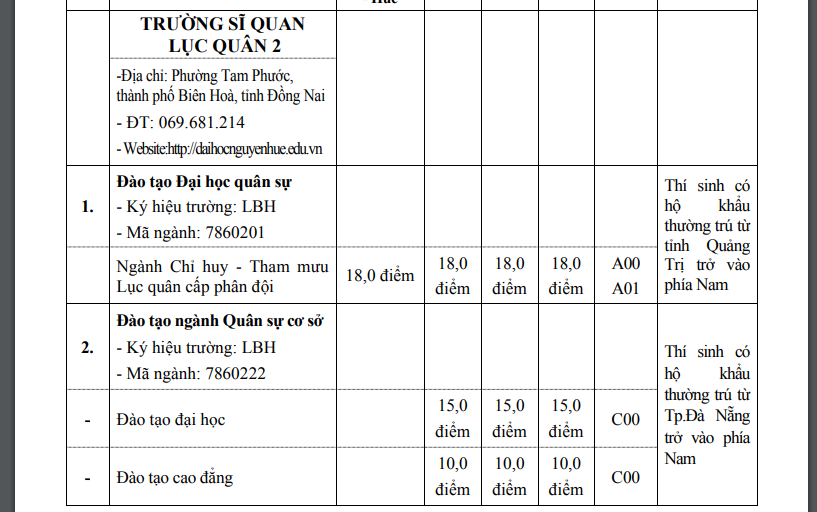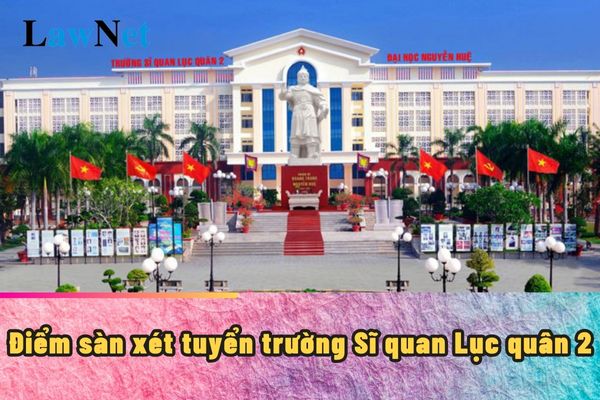Vietnam: What are the minimum admission scores of 2rnd Army College in 2024?
In Vietnam, what are the minimum admission scores of the 2nd Army College in 2024?
2nd Army College, also known as Nguyen Hue University, under the Ministry of National Defense, is a center for training infantry command officers in the southern region of Vietnam.
The minimum admission scores of the 2nd Army College in 2024 are as follows:

Download Detailed information on enrollment for full-time undergraduate and college programs in case of admission by the results of the High School Graduation Exam for 2nd Army College (Nguyen Hue University).
What are the 3 principles of enrollment for full-time undergraduate programs in Vietnam?
According to Article 4 of the regulations on enrollment for full-time undergraduate and college programs in Early Childhood Education, issued along with Circular 08/2022/TT-BGDDT, the 3 principles of enrollment for full-time undergraduate programs in Vietnam include:
Principle [1]: Fairness to candidates
+ Regarding information provision: Every interested candidate will be provided with full, clear, reliable, and consistent information promptly, enabling them to make appropriate decisions and best prepare for the admissions process;
+ Regarding opportunities to apply: No candidate will lose the opportunity to apply due to regulations not related to their qualifications or abilities (except for specific regulations by the Ministry of Public Security and the Ministry of National Defense concerning defense and security fields); or due to cumbersome and costly application processes;
+ Regarding capability assessment: Candidates must be evaluated objectively, fairly, and reliably concerning their study potential and prospects for success, meeting the requirements of the training programs and disciplines;
+ Regarding admission chances: Candidates must be granted the highest opportunity to gain admission and the right to determine their preferred training programs and disciplines among those they qualify for;
+ Regarding commitment fulfillment: Educational institutions must fulfill their commitments to candidates, providing advice, support, and addressing complaints, safeguarding the legitimate rights of candidates in risky situations.
Principle [2] Equality among educational institutions
+ Regarding cooperation: Educational institutions should cooperate equally to enhance the quality and effectiveness of the admission process while bringing the best benefits to candidates;
+ Regarding competition: Educational institutions should compete honestly, fairly, and healthily in the admissions process according to competition law.
Principle [3] Transparency to society
+ Regarding information transparency: Educational institutions are responsible for publicly announcing full, clear, and prompt admission information through suitable media for public and regulatory oversight;
+ Regarding accountability: Educational institutions are obliged to report upon request by regulatory agencies and explain issues of great concern to the public in a suitable manner.

In Vietnam, what are the minimum admission scores of 2rd Army College in 2024? (Image from the Internet)
What are the regulations on the enrollment methods for full-time undergraduate programs in Vietnam?
Under Article 6 of the Regulation on Enrollment for full-time Undergraduate and College programs in Early Childhood Education issued together with Circular 08/2022/TT-BGDDT, the enrollment methods for full-time undergraduate programs in Vietnam are specified as follows:
- Education and training institutions can choose the methods of enrollment (entrance examination, admission examination, or combination of entrance examination and admission), generally applied to the whole education and training institution or separately applied to several programs, industries, fields, and forms of training.
- Each enrollment method must specify the criteria for assessment and admission and how to use a combination of criteria to classify, rank, and determine the matriculation conditions for candidates according to the requirements of the training program or discipline. Criteria for assessment and admission must be based on the requirements of background knowledge and core competencies that candidates need to study training programs and disciplines.
- For enrollment method based on academic results, exam results for each subject (including final scores of upper secondary school subjects, test scores of upper secondary school graduation subjects, and other assessment results):
+ The combination of subjects used for admission includes at least 3 subjects suitable to the characteristics and requirements of the training program (coefficients can be calculated for each subject), including mathematics or literature;
+ A discipline or a training program may use several combinations of subjects at the same time, in which the difference between combinations can be specified when determining admission conditions;
+ Do not use more than 4 combinations of admission for one discipline or training program (except for cases where subject combinations differ only in foreign languages).
- A discipline or a training program has its own criteria for each enrollment method or selection complex:
+ The allocation of targets between methods and combinations of admission must have reasonable grounds; do not cause unfairness to candidates who choose different methods and combinations of admission;
+ The change or addition of the method or combination of admission must have reasonable grounds and roadmap; Do not reduce the target allocation rate of a method or combination used in the previous year by more than 30% (in the target structure of the sector or training program) unless such change or supplement has been announced at least 1 year before the opening of registration for recruitment.
- The education and training institution shall be accountable for scientific and practical bases in determining enrollment methods, enrollment methods, admission complexes, and allocation of enrollment targets based on analyzing, assessing, and comparing the academic results of matriculated students every year.

